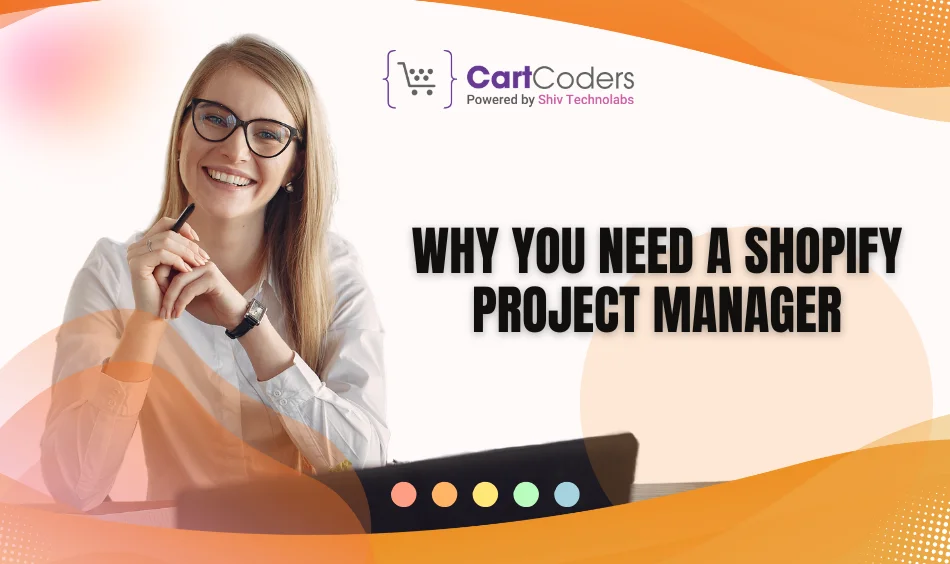Custom Engagement Solutions
Unlock tailored solutions with a free, no-obligation strategy session.
Expert Developers & Engineers on Demand
Scale Your Team with Skilled IT Professionals
Expert Guidance for Digital Transformation

Successful Shopify stores cannot be built solely with good products. You require a person who can handle the whole project until its completion. This is where a Shopify project manager will fit in. They take care of everything from planning to launching.
How can you ensure that you are getting the right employee? Many business owners do not ask the correct questions, which causes delays, cost overruns, and aborted launches. The success ratio of Shopify stores lies between 5% and 10 %; that is, most stores fail. An effective project manager will enable you to overcome these odds.
Paying a Shopify project manager is worth investing in your future. The right one will save you time, money, and stress. They will ensure that your shop is opened as promised and works well. However, a bad hire may cost you thousands and delay months. This is why asking the right questions in the interview is essential. Are you interested in getting the best Shopify project manager to support your business? This guide will help you hire a Shopify project manager.

Here are the reasons that prove why you need a Shopify Project Manager:
Every year, E-commerce projects become more complex. In 2024, more people will use Shopify through mobile devices, with 79% of traffic being generated by phones and tablets, so your store must operate flawlessly in these devices. The Shopify project manager is aware of how to deal with such challenges.
Shopify project manager role responsibilities include:
Most e-commerce projects face similar problems. A skilled Shopify project manager prevents these issues before they happen.
Common project problems they prevent:
| Cost Factor | Project Manager | Without a Project Manager |
| Upfront Cost | $2,000 – $10,000+ (PM fees) | $500–$2,000 (tools) |
| Time Investment | 10–20 hours | 100–200+ hours (hands-on work & coordination) |
| Tool/Software Costs | $0 – $500 | $200 – $1,000 (Tools Investment) |
| Error Correction/Redos | $0 – $1,000 (reduced with expert oversight) | $500 – $5,000 (common in first-time DIY) |
| Project Delay Cost | $0 – $2,000 (rare with good PM) | $500 – $10,000 (due to delays) |

Still confused about what to ask a Shopify project manager? Here are 8 questions that can help you in hiring Shopify project manager.
This is the most critical question to ask. You want someone who knows Shopify inside and out.
What to look for in their answer:
Follow-up questions to ask:
Project management is dependent on time management. The success rate of agile projects is 64%, significantly higher than that conventional methods.
Key areas to explore:
Timeline management checklist:
Scope changes happen in almost every project. A good Shopify implementation manager has a clear process for handling these requests.
Their process should include:
| Scope Change Type | Typical Impact | Manager Response |
| Minor Feature Addition | 1-3 days delay | Quick approval process |
| Major Feature Change | 1-2 weeks delay | Formal change request |
| Design Overhaul | 2-4 weeks delay | New project phase |
| Integration Addition | 3-7 days delay | Technical assessment first |
Communication is key to project success. The average conversion rate on Shopify is 1.4%, with top-performing stores reaching above 3.3%. Good communication helps create stores that convert better.
Communication standards to expect:
Communication tools they should use:
Project management tools make a big difference in project success.
Project Management:
Technical Tools:
| Tool Category | Popular Options | Key Benefits |
| Project Management | Asana, Trello, Monday | Task tracking, collaboration |
| Communication | Slack, Microsoft Teams | Real-time messaging |
| File Sharing | Google Drive, Dropbox | Document collaboration |
| Time Tracking | Harvest, Toggl | Accurate billing |
| Testing | BrowserStack, CrossBrowserTesting | Multi-device testing |
Quality control is essential for a successful launch. Your Shopify store launch manager should have a straightforward testing process.
Quality control checklist:
Testing phases they should follow:
Most Shopify stores need third-party integrations. Shopify merchants have downloaded over 25 million apps from the Shopify App Store.
Common integrations to ask about:
Integration expertise indicators:
Your relationship with a Shopify project manager doesn’t end at launch. With Shopify growing by around 20% in 2024, the platform continues to evolve—making ongoing support and strategy essential for long-term success.
Post-launch services to expect:
Support timeline structure:
Warning signs:
Red flags during interviews:
Missing credentials checklist:
| Skill Category | Beginner | Intermediate | Expert |
| Shopify Experience | 1-5 stores | 6-20 stores | 20+ stores |
| Project Management | Basic tools | Certified PM | Advanced methodologies |
| Technical Knowledge | Basic understanding | Good grasp | Deep expertise |
| Communication | Good | Good | Excellent |
| Problem Solving | Simple issues | Complex challenges | Crisis management |
Your store can never be successful without hiring the right Shopify project manager. Following the given hiring Shopify project manager checklist will help you identify the right people who know your needs and can deliver.
Do not forget the saying, “The cheapest is not always the best.” Pay attention to the kind of person who can be hired with the right experience and skills. An excellent project manager will help save you some cash in the long term by eliminating expensive errors and downtime.
Take time over the hiring process. Consider these eight questions and listen to the answers. Research sources and begin with a smaller job, where possible. Such caution will help you determine the ideal Shopify project management associate for your company. Some companies, such as CartCoders, are focused on delivering skilled Shopify project managers who can manage complex e-commerce projects. They know what it takes to work with Shopify, having completed the process, and they can guide you in making your project a success in every aspect.
Projects delivered in 15+ industries.
95% retention rate, building lasting partnerships.
Serving clients across 25+ countries.
60+ pros | 10+ years of experience.